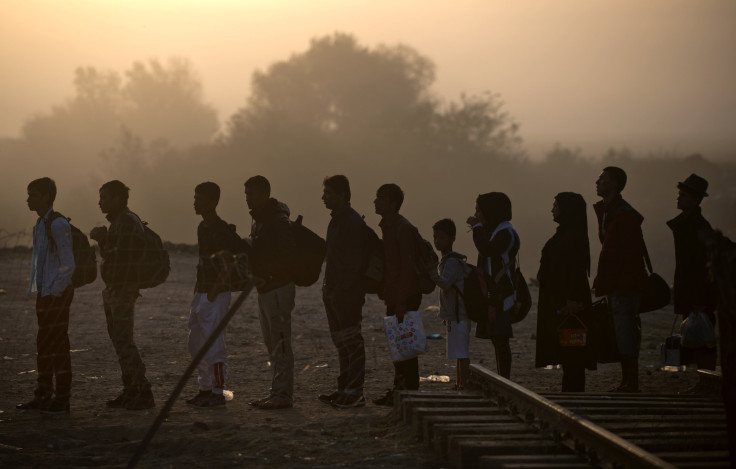Europe Refugee Crisis: Refugees Keep Coming To Greek Island Of Lesbos Despite Warnings and Waits

LESBOS, Greece -- A few meters away from where refugees sleep on the streets, locals are drinking their morning coffee and smoking their first cigarette of the day in beachfront cafes. This Greek island in the eastern Aegean Sea, at its closest point only six miles from Turkey, is a common stop on the migrant route to Europe. Since the beginning of summer, more than 35,000 people have landed on Lesbos’ northern shores, arriving from the Middle East and Africa in rubber dinghies that are ill-equipped for open water.
In Hungary, the government has started building a new fence on its border with Croatia. In Croatia, the prime minister plans to redirect refugees to Hungary and Slovenia. Slovenia says it will send the migrants back to Croatia. But the refugees pay no heed. They keep on coming.
Some 10,000 arrived on Lesbos last week alone, leading to riots as the Greek authorities struggled to hold back hundreds of new arrivals desperate to reach the mainland.
Refugees are not allowed to leave until they have registered, but the numbers arriving are overwhelming the island’s infrastructure, leaving a backlog of weary, angry people trapped in a place where they don’t want to be.
In a former army barracks outside the village of Moria, a long, winding line of rucksacks bifurcates the camp’s interior. Each bag represents an individual or a family waiting to register. Too hot to stand in the midday sun, refugees sit in the shade of the brick and razor-wire walls instead.
A handful of riot police with shields line up on the other side of the divide, ready to step in at the first rumble of dissent.
The air is thick with panic and confusion. “Can you help me?” asks a man in his 40s, gesturing to his heart. “I have pain, injury. I need to see someone. I need to register now.”
But apart from the police, there’s no one to see. The Greek volunteers are behind a gated door – they will not see anyone until it is their designated turn.
The sick man looks resigned to his fate. His name is Ali. He’s from the southeastern city of Amarah in Iraq. He came alone -- his wife and two sons remain in Iraq. He’s scared, he says, to give his last name as that might put his family at risk. After he receives asylum status, he wants to bring them over to join him.
Unlike the majority of refugees who want to go to Germany, Ali wants to go to England. He points to the dirt-encrusted jacket he is wearing, which bears the insignia “Polo Ralph Lauren, Great Britain.”
He thinks things will be better for him there.
“Iraq is no good,” he says. “I am a Sunni [Muslim] living in a Shia [rival Muslim sect] area.” There are many active Shia militants, he tells International Business Times, who would happily kill a man for nothing more than his Sunni status.
“They killed my father and my sister,” Ali says. His eyes tear up. He looks away, not wanting to be seen crying.
This camp thrums with human misery.
It is the largest camp on the island and the most run-down. Another camp, a few miles away, is for Syrian refugees only. The difference is palpable. The Syrian camp receives funding from the International Rescue Committee – aid workers are dotted around the place. There’s a clearly designated washing area and most of the tents are in good condition. Most of the camp's residents are from Syria’s educated middle-classes, fleeing the war that's been going on for three years.
People in Moria are poorer – their clothes are frequently ripped and frayed. The refugees here know their Syrian neighbors receive better treatment. A wild-eyed man approaches. “They say I’m not Syrian. I am. I don’t sound the same, but I am.”
Many of these asylum-seekers may, by European Union standards, not qualify for refugee status at all but instead be termed economic migrants. The majority are from Iraq and Afghanistan, but there are also groups from Eritrea, Somalia and Sudan.
They leave not only war but a complete lack of opportunities. A young Somali boy tells IBT, “We have no jobs, nothing. We cannot stay.” He wants to go to Finland. “I like Finland. They are kind to refugees.”
Despite the days and weeks on the road, the physical and mental exhaustion, the refugees are united in their determination to make it to northern Europe.
“We will wait as long as it takes,” Ahmed, a 22-year-old Iraqi, says. He is making the journey with his cousin Amir – both come from the northern city of Mosul, controlled by the Islamic State group since June of last year. Amir’s arms are covered with scars. They’re burns, he says, from shelling by Daesh (the Arabic acronym for Islamic State).
He knew the journey would be long and difficult, but it is an improvement over what he left behind.
“We don’t want to be here, but we have no choice,” Ahmed says. “Daesh or here. What would you choose?”
When asked if they are worried about the Hungarian and Croatian borders closing, the young men are resolute. “We will find a way,” they say, “Inshallah.”
© Copyright IBTimes 2025. All rights reserved.






















